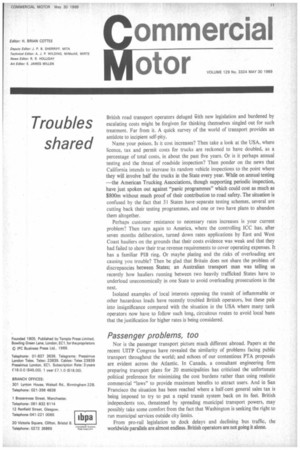Troubles shared
Page 13

If you've noticed an error in this article please click here to report it so we can fix it.
British road transport operators delugedc-vith new legislation and burdened by escalating costs might be forgiven for thinking themselves singled out for such treatment. Far from it. A quick survey of the world of transport provides an antidote to incipient self-pity.
Name your poison. Is it cost increases? Then take a look at the USA, where licence, tax and permit costs for trucks are reckoned to have doubled, as a percentage of total costs, in about the past five years. Or is it perhaps annual testing and the threat of roadside inspection? Then ponder on the news that California intends to increase its random vehicle inspections to the point where they will involve half the trucks in the State every year. While on annual testing —the American Trucking Associations, though supporting periodic inspection, have just spoken out against "panic programmes" which could cost as much as $800m without much proof of their contribution to road safety. The situation is confused by the fact that 31 States have separate testing schemes, several are cutting back their testing programmes, and one or two have plans to abandon them altogether.
Perhaps customer resistance to necessary rates increases is your current problem? Then turn again to America, where the controlling ICC has, after seven months deliberation, turned down rates applications by East and West Coast hauliers on the grounds that their costs evidence was weak and that they had failed to show their true revenue requirements to cover operating expenses. It has a familiar P1B ring. Or maybe plating and the risks of overloading are causing you trouble? Then be glad that Britain does not share the problem of discrepancies between States; an Australian transport man was telling us recently how hauliers running between two heavily trafficked States have to underload uneconomically in one State to avoid overloading prosecutions in the next.
Isolated examples of local interests opposing the transit of inflammable or other hazardous loads have recently troubled British operators, but these pale into insignificance compared with the situation in the USA where many tank operators now have to follow such long, circuitous routes to avoid local bans that the justification for higher rates is being considered.
Passenger problems, too
Nor is the passenger transport picture much different abroad. Papers at the recent UITP Congress have revealed the similarity of problems facing public transport throughout the world; and echoes of our contentious PTA proposals are evident across the Atlantic. In Canada, a consultant engineering firm preparing transport plans for 20 municipalities has criticized the unfortunate political preference for minimizing the cost burdens rather than using realistic commercial "laws" to provide maximum benefits to attract users. And in San Francisco the situation has been reached where a half-cent general sales tax is being imposed to try to put a rapid transit system back on its feet. British independents too, threatened by spreading municipal transport powers, may possibly take some comfort from the fact that Washington is seeking the right to run municipal services outside city limits.
From pro-rail legislation to dock delays and declining bus traffic, the worldwide parallels are almost endless. British operators are not going it alone.












































































































